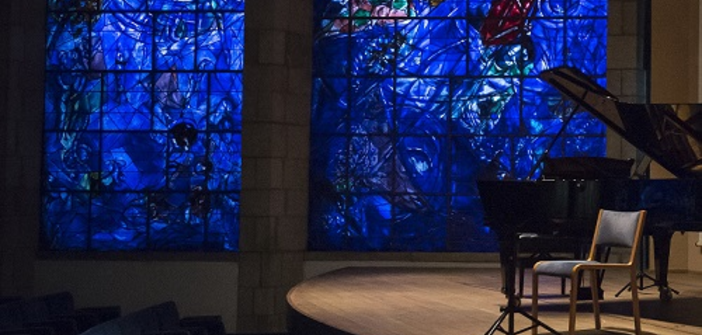“What is merely modern only lives from today to tomorrow, whether it concerns art, politics, or concepts of existence.” Thus expressed composer Arnold Schoenberg about his comedy titled “From Today to Tomorrow,” created in 1930.
This same title has been chosen for this new Festival presented in the magnificent setting of the Auditorium of the Marc Chagall National Museum. Fashions and what is “modern” come and go, only the essential remains. Yet, it is essential to demonstrate that there is no break in the history of music.
The six programs representative of the various European trends at this festival mix what is already established and, in a way, belongs to yesterday, with what is to be explored today: lesser-known composers who have followed in the footsteps of their predecessors and, finally, what one should be curious to listen to tomorrow: works by living composers who are part of a history in perpetual writing and constant search.
Curiosity is a beautiful virtue, a component of the irrepressible need to learn: it is the desire to know, to confront novelty, to question things.
The richness of these repertoires follows the path of musical writing in perpetual renewal!
Program for Friday, October 6th at 8 PM
Béla Bartók, Romanian Dances for trio, arrangement by Christophe Patrix
Georges Enesco, Sonata No.3 “in the Romanian folk style” for violin and piano
Stjepan Sulek, Sonata vox Gabrieli for trombone and piano
Frigyes Hidas, Rhapsody for trio
Grigoras Dinicu, The Lark in trio, arrangement by Christophe Patrix
Violin: Violaine Darmon
Trombone: Raphaël Patrix
Piano: Stéphanos Thomopoulos
If Béla Bartók (1881-1945) needs no introduction, a few words are necessary for Georges Enesco (1881-1955). Though primarily a composer, the performer (violinist, pianist, conductor) often overshadowed this fundamental aspect of his musical vocation. Enesco also established himself as an outstanding pedagogue: he was the mentor of Yehudi Menuhin. While he loved the chromatic shifts that make it instantly recognizable, the music of Croatian Stjepan Šulek (1914-1986) is fundamentally tonal but doesn’t always maintain classical tonal unity. Composer Frigyes Hidas (1928-2007) studied composition at the Franz Liszt Academy and became the Music Director of the National Opera of Budapest. His work spans all genres, from opera to chamber music. Romanian Grigoraș Dinicu (1889-1949) learned violin in the popular Gypsy environment. Later, he studied at the Bucharest Conservatory and played a significant role in disseminating music without being limited to traditional venues where it could be performed.
Program for Saturday, October 7th at 8 PM
Ernest Bloch, Mystical Poem for violin and piano
Arnold Schoenberg, Fantasy for violin and piano opus 47
Mauricio Kagel, Klangwölfe for violin and piano
Hankus Netsky, Klezmer Suite — Chagall’s Mandolins for solo violin, piano, and strings
Solo violin: Reine Brigitte Sulem
Piano: Jean Bernard Matter
Violins 1: Radu Gherginciu, Patrick Lee-Barot
Violins 2: Pascal Roederer, Diane Bouchet
Violas: Noémie Bialobroda, Sylvia Peneva
Cello: Delphine Perrone
Double bass: Philippe Bonifas
Here too, we will refrain from talking about Arnold Schoenberg (1874-1951), already widely known, to instead mention Swiss Ernest Bloch (1880-1959) who studied violin with Eugène Ysaÿe. Conductor in Lausanne and Neuchâtel, he settled in the United States in 1916. He became a composition professor in Cleveland, then in San Francisco where he served as the conservatory director from 1925 to 1930. He gained American citizenship in 1924. Mauricio Kagel (1931-2008) was born in Buenos Aires in 1931. Settled in Germany since 1957, he mainly focused on instrumental theater and also explored the dramatic resources of contemporary musical language in radio plays, films, and electroacoustic works. Hankus Netsky, born in 1955, is a multi-instrumentalist and ethnomusicologist. He works on the preservation of traditional Jewish music from Eastern Europe.
Program for Monday, October 9th at 8 PM
Sergio Monterisi, Concerto della Fenice for bassoon and string quintet
Stanislaw Moryto, Kwartet Sadecki, String quartet
Laurent Petitgirard, The Dream of Merrick (1999) for solo harp
Jean Françaix, Divertimento for string quintet and principal bassoon
Claude Debussy, String quartet in G minor
Violins: Judith Le Monnier, Lucie Mallet de Chauny
Viola: Hélène Coloigner
Cello: Anne Bonifas
Double bass: Fabrizio Bruzzone
Bassoon: Laurent Van Eenod
Harp: Helvia Briggen
Sergio Monterisi (1970) completed his musical studies in Bari. After notably conducting 18th-century operas, such as the first modern performance of La Cecchina maritata by Niccolò Piccinni, he was appointed “Resident Conductor” and musical director of the NEC Sinfonietta at the prestigious New England Conservatory in Boston in 2002. Polish composer, organist, and pedagogue Stanisław Moryto was born in 1947. From 2005 to 2012, he served as rector of the Fryderyk Chopin University of Music in Warsaw, where he currently teaches. Laurent Petitgirard, born in 1950, is an eclectic musician whose career as a composer of symphonic music (with more than twenty works including two operas) and film scores (160 scores) is complemented by his activity as a guest conductor worldwide. He has been the Music Director of the Orchestre Colonne since December 2004. Jean Françaix (1912-1997), born into a family of musicians, met Ravel at the age of 11, who encouraged him to pursue and develop his curiosity. He won his first piano prize at the Paris Conservatory at age 18. Among numerous works, Jean Françaix composed the music for about ten films, including Si Versailles m’était conté by Sacha Guitry (1954).


